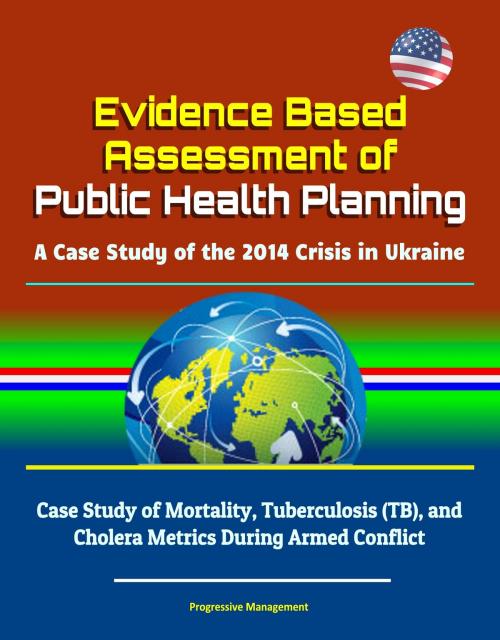Evidence Based Assessment of Public Health Planning: A Case Study of the 2014 Crisis in Ukraine - Case Study of Mortality, Tuberculosis (TB), and Cholera Metrics During Armed Conflict
Nonfiction, History, Asian, Former Soviet Republics, Health & Well Being, Medical, Reference, Public Health| Author: | Progressive Management | ISBN: | 9780463662748 |
| Publisher: | Progressive Management | Publication: | May 14, 2018 |
| Imprint: | Smashwords Edition | Language: | English |
| Author: | Progressive Management |
| ISBN: | 9780463662748 |
| Publisher: | Progressive Management |
| Publication: | May 14, 2018 |
| Imprint: | Smashwords Edition |
| Language: | English |
This excellent report has been professionally converted for accurate flowing-text e-book format reproduction.
The 2014 crisis in Ukraine presents an opportunity to evaluate public health planning support for a nation experiencing armed conflict. Historical evidence supports the findings of mortality, tuberculosis, and cholera as appropriate metrics to define the state of public health planning support for a given nation. Data from these metrics demonstrate the results of potential threats to public health planning. Potential threats induce risk into a system and can be magnified when affected by multiple sectors, such as considered in for the domains of politics, military, social, economic, and information. Together, the risks can quickly overwhelm a public health system. When this happens, external organizations in the region and international community must respond to maintain their own national interests. Analysis provided several findings for Ukraine's public health planning effectiveness after experiencing armed conflict. As a result of the crisis, health care infrastructure was destroyed, health care workers fled, migrating patterns of vulnerable populations increased, and logistical lines of communication were disrupted. These triggers diminished the capabilities of Ukraine's public health planning. The international community responded, but true costs are yet unknown. Future study should apply real options theory to costs and requirements associated with Ukraine's capacity for public health planning to estimate an actual cost of this crisis.
The planning for public health is a complex challenge that has involved societies over the past two millennia. Hippocrates writes of public health considerations of air, water, and places; John Snow writes of cholera transmission; Robert Koch of tuberculosis; and Florence Nightingale details sanitation issues of health care facilities. These demonstrate how recurring themes in public health and with sanitation include both the person and the environment.
The challenge of public health planning support with respect to the person includes disease transmission, germ theory, and appropriate interventions. The challenge of public health planning support with respect to the environment includes establishing and sustaining sanitary and stable conditions. These challenges pose risk to public health because of their potential for morbidity and mortality from preventable disease or environmental injury. Challenges to planning for public health support each have an associated cost, whether direct or indirect. Causes of indirect costs are of greater complexity, such as the case of political, economic, or military instability. Resources are limited and can often be diverted to other sectors.
Some of the other sectors that compete for resources of foreign assistance with public health include peace and security; democracy, human rights, and governance; education and social services; economic development; environmental protection; and humanitarian assistance. To maximize the opportunities for success in countering challenges to public health planning support, each of the sectors must understand and internalize a collaborative approach to resourcing. With competing interests among sectors, planners of public health can leverage shared values from other sectors of common problems, to plan mutually beneficial strategies.
This excellent report has been professionally converted for accurate flowing-text e-book format reproduction.
The 2014 crisis in Ukraine presents an opportunity to evaluate public health planning support for a nation experiencing armed conflict. Historical evidence supports the findings of mortality, tuberculosis, and cholera as appropriate metrics to define the state of public health planning support for a given nation. Data from these metrics demonstrate the results of potential threats to public health planning. Potential threats induce risk into a system and can be magnified when affected by multiple sectors, such as considered in for the domains of politics, military, social, economic, and information. Together, the risks can quickly overwhelm a public health system. When this happens, external organizations in the region and international community must respond to maintain their own national interests. Analysis provided several findings for Ukraine's public health planning effectiveness after experiencing armed conflict. As a result of the crisis, health care infrastructure was destroyed, health care workers fled, migrating patterns of vulnerable populations increased, and logistical lines of communication were disrupted. These triggers diminished the capabilities of Ukraine's public health planning. The international community responded, but true costs are yet unknown. Future study should apply real options theory to costs and requirements associated with Ukraine's capacity for public health planning to estimate an actual cost of this crisis.
The planning for public health is a complex challenge that has involved societies over the past two millennia. Hippocrates writes of public health considerations of air, water, and places; John Snow writes of cholera transmission; Robert Koch of tuberculosis; and Florence Nightingale details sanitation issues of health care facilities. These demonstrate how recurring themes in public health and with sanitation include both the person and the environment.
The challenge of public health planning support with respect to the person includes disease transmission, germ theory, and appropriate interventions. The challenge of public health planning support with respect to the environment includes establishing and sustaining sanitary and stable conditions. These challenges pose risk to public health because of their potential for morbidity and mortality from preventable disease or environmental injury. Challenges to planning for public health support each have an associated cost, whether direct or indirect. Causes of indirect costs are of greater complexity, such as the case of political, economic, or military instability. Resources are limited and can often be diverted to other sectors.
Some of the other sectors that compete for resources of foreign assistance with public health include peace and security; democracy, human rights, and governance; education and social services; economic development; environmental protection; and humanitarian assistance. To maximize the opportunities for success in countering challenges to public health planning support, each of the sectors must understand and internalize a collaborative approach to resourcing. With competing interests among sectors, planners of public health can leverage shared values from other sectors of common problems, to plan mutually beneficial strategies.















